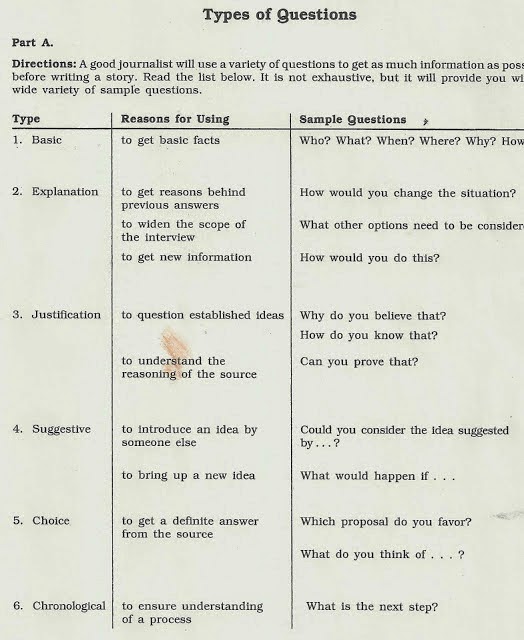
IMPORTANT: you will need ear buds on Thursday.
Learning Target: I can analyze the purpose of information, so as to propel a conversation by posing and responding to questions that probe reasoning and evidence, ensuring a full range of positions on a topic or issue; clarify, verify or challenge ideas and conclusions; and promote divergent and creative perspectives.
What is interview?
Meaning of interview: The word interview comes from Latin and middle French words meaning to “see between” or “see each other”. Generally, interview means a private meeting between people when questions are asked and answered.
So, an interview is formal meetings between two people (the interviewer and the interviewee) where questions are asked by the interviewer to obtain information, qualities, attitudes, wishes etc.
Types of Interviews
- Personal interviews: Personal interviews include:
- Selection of the employees
- Promotion of the employees
- Retirement and resignation of the employees
Of course, this type of interview is designed to obtain information through discussion and observation about how well the interviewer will perform on the job.
- Evaluation interviews: The interviews which take place annually to review the progress of the interviewee are called the evaluation interviews. Naturally, it is occurring between superiors and subordinates. The main objective of this interview is to find out the strengths and weaknesses of the employees.
- Persuasive interviews: This type of interview is designed to sell someone a product or an idea. When a sales representative talk with a target buyer, persuasion takes the form of convincing the target that the product or idea meets a need.
- Structured interviews: Structured interviews tend to follow formal procedures; the interviewer follows a predetermined agenda or questions.
- Unstructured interviews: When the interview does not follow the formal rules or procedures. It is called an unstructured interview. The discussion will probably be free flowing and may shift rapidly form on subject to another depending on the interests of the interviewee and the interviewer.
- Counseling interviews: This may be held to find out what has been troubling the workers and why someone has not been working.
- Disciplinary interviews: Disciplinary interviews are occurring when an employee has been accused of breaching the organization’s rules and procedures.
- Stress interviews: It is designed to place the interviewee in a stress situation in order to observe the interviewees reaction.
- Public interviews: These include political parties’ radio-television and newspaper.
- Informal or conversational interview: In the conversational interview, no predetermined questions are asked, in order to remain as open and adaptable a possible to the interviewee’s nature and priorities; during the interview the interviewer “goes with the flow”.
- General interview guide approach: The guide approach is intended to ensure that the same general areas of information are collected from each interviewee this provides more focus than the conversational approach but still allows a degree of freedom and adaptability in getting the information from the interviewee.
- Standardized or open-ended interview: Here the same open-ended questions are asked to all interviewees; this approach facilitates faster interviews faster interviews that can be more easily analyzed and compared.
- Closed or fixed-response interview: It is an interview where all interviewers ask the same questions and asked to choose answers from among the same set of alternatives. This formal is useful for those not practiced in interviewing.
BACK TO BACK INTERVIEWS:
Review the types of questions below. Now select an
historical figure. This may be someone in realm of politics,
sports or the arts; however, they have one thing in common:
each is dead. Take approximately 20 minutes and read a
minimum of two sources about this individual. In this
situation, Wikipedia is acceptable for one. Now compose a
list of questions asking two of each type of question
listed below; that's a total of twelve questions. Send along by
the end of class tomorrow, . Include the two sources (title
and URL) on your document. Have fun. Remember your
questions should be detailed, and demonstrate that you
have knowledge of the that individual's background.
Note that the sample styles of questions below: basic,
explanation, justification, suggestive, choice and
chronological.



No comments:
Post a Comment